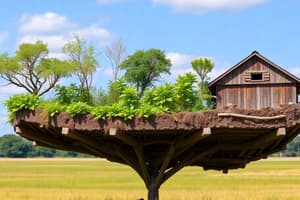Podcast
Questions and Answers
What refers to the long-term state of the atmosphere at a particular location?
What refers to the long-term state of the atmosphere at a particular location?
- Climate Change
- Weathering
- Climate Systems
- Climate (correct)
What is the term for short-term changes in the atmosphere?
What is the term for short-term changes in the atmosphere?
- Weather (correct)
- Climate Systems
- Weathering
- Climate
Which layer of the atmosphere is closest to the ground and where most weather occurs?
Which layer of the atmosphere is closest to the ground and where most weather occurs?
- Troposphere (correct)
- Exosphere
- Mesosphere
- Thermosphere
What are the components of the global climate system?
What are the components of the global climate system?
What is the primary objective of studying climate change from a biological perspective?
What is the primary objective of studying climate change from a biological perspective?
What is the term for the ability of ecosystems to withstand and recover from disturbances?
What is the term for the ability of ecosystems to withstand and recover from disturbances?
What is the primary goal of renewable energy technologies?
What is the primary goal of renewable energy technologies?
What is the term for the preservation and protection of biodiversity?
What is the term for the preservation and protection of biodiversity?
What is the term for the management of natural resources in a way that maintains their health and productivity?
What is the term for the management of natural resources in a way that maintains their health and productivity?
What is the term for the reduction of greenhouse gas emissions to mitigate climate change?
What is the term for the reduction of greenhouse gas emissions to mitigate climate change?
Flashcards are hidden until you start studying
Study Notes
Climate Change
- Climate change poses a significant threat to both human well-being and biodiversity, with its negative impacts already being felt globally.
- Rising temperatures, changes in precipitation patterns, and an uptick in extreme weather events disrupt ecosystems, modify habitats, and endanger the survival of numerous species.
- Human activities such as deforestation, urban expansion, and the combustion of fossil fuels exacerbate climate change, amplifying its adverse effects on nature and society.
Impact of Climate Change on Ecosystems
- Disruptions to food webs can lead to mismatches in the timing of key ecological events, such as flowering, migration, and predator-prey interactions, with cascading effects throughout ecosystems.
- Climate change can impair the ability of ecosystems to provide essential services, such as clean air, clean water, pollination, flood regulation, and carbon sequestration.
- The loss of biodiversity not only diminishes the resilience and stability of ecosystems but also threatens human well-being by reducing the availability of ecosystem services and disrupting vital ecological processes.
Taking Action on Climate Change
- Simple changes in daily routines, like using less energy, reducing waste, and choosing sustainable products, can add up to a big impact on reducing carbon emissions.
- Supporting good policies, voting for leaders who prioritize climate action, and getting involved in local projects and initiatives can help build resilience and strengthen communities' ability to tackle climate change.
- Working together across borders, industries, and generations is essential to find solutions and create a healthier, more sustainable world for everyone.
Reducing Carbon Footprint
- Lifestyle changes such as using public transportation, carpooling, biking, or walking instead of driving alone can help reduce carbon footprint.
Understanding Climate
- Climate is the long-term state of the atmosphere at a particular location, essentially the "average weather" over a long period of time.
- Climate change affects biodiversity, where species live, and how they behave, and understanding it from a biological viewpoint helps us see how living things, ecosystems, and Earth's atmosphere are all connected.
- Combining biological knowledge with climate models can help predict how climate change affects global biodiversity and make smart choices to protect nature in the face of climate change.
Studying That Suits You
Use AI to generate personalized quizzes and flashcards to suit your learning preferences.




